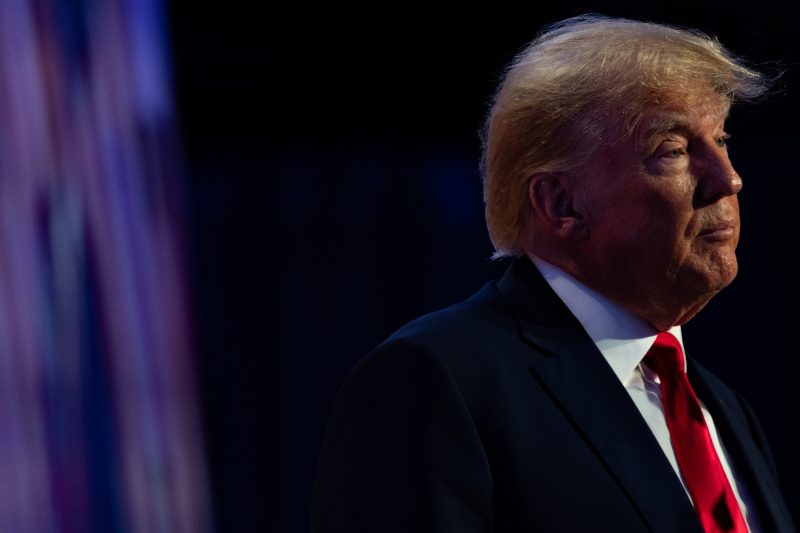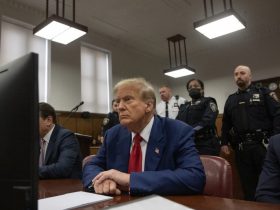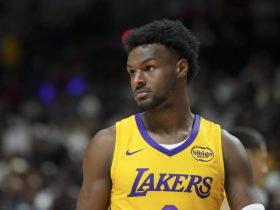For 2½ years after rioters swarmed the Capitol, criminal investigations into Donald Trump and his allies for attempting to overturn the 2020 election percolated quietly. Now, just as another presidential campaign featuring Trump accelerates toward primary season, the assorted local, state and federal probes are bursting into highly visible action — seemingly all at once.
Trump disclosed on Tuesday he had been named as a target in special counsel Jack Smith’s probe of election interference. Hours later, the attorney general of Michigan announced she had issued forgery charges against 16 Trump supporters who had posed as the state’s presidential electors. A county prosecutor in Georgia is preparing to present a sweeping case to a grand jury, with indictments possible within weeks. And the attorney general of Arizona in recent months has ramped up a probe into attempts to undermine the 2020 results in that state.
The proliferation of charges and expected charges marks the most extensive effort yet to hold accountable those who attempted to help Trump remain in office after he lost the election. And because they come as the former president makes vindication a central pillar of his 2024 campaign, experts say they will mark an extraordinary test of the nation’s criminal justice system and political institutions.
“I think we are in as precarious situation as we’ve ever been,” said Republican attorney Benjamin Ginsberg. “I don’t know what the chances are of things really going off the rails, but no question that there is a toxic mix unprecedented in the American experiment.”
The wide-ranging probes come at one of the most polarized times in modern U.S. history, and voters are responding in partisan ways. Trump’s detractors are cheering the prospect of a potential wave of prosecutions after wondering for years if they would ever come. His backers see the developments as the clearest sign yet that his opponents — a group they say includes government institutions such as the Justice Department and FBI — will use every tool available to sink Trump’s campaign.
Ginsberg, an election lawyer who played a leading role in the 2000 Florida recount when he represented the presidential campaign of George W. Bush, has emerged as a Trump critic in recent years. He said he saw a well-executed prosecution of Trump as a way to convince a portion of his supporters that the country runs its elections fairly, despite Trump’s repeated false claims to the contrary.
“The hope is that the case is so overwhelming that it can eventually lead to people having faith in the elections again, because they see how pernicious a conspiracy this was and how unfounded the charges of rigged elections are,” he said.
But there’s also potential peril. “Where we are now is sort of teetering on the unsustainable given how widespread the lack of faith in elections is,” he said.
Smith’s sprawling Jan. 6 investigation has involved dozens of Trump advisers, Republican officials, lawyers and other allies appearing in front of a grand jury that meets on Tuesdays and Thursdays in Washington. The sessions have often served as a way to get Trump’s own people to dispute his claims about the 2020 vote.
The grand jury has been presented with unsupported conspiracy theories that were promoted by Trump, as well as reports commissioned by his team that dispute those claims. One person with direct knowledge of the grand jury’s activities, who spoke on the condition of anonymity to discuss an ongoing investigation, said some of the sessions seem intended to disprove Trump’s election falsehoods once and for all.
The flurry of activity in the election-related cases comes as Trump is facing several other legal challenges. The former president is facing criminal charges in Manhattan and two civil lawsuits in New York, with all of those scheduled to go to trial this year or in early 2024. And Trump has also been charged by Smith with allegedly mishandling classified documents.
Charges over the 2020 election would add to his legal woes and place into focus his direction of a multipronged effort to undermine a core feature of American democracy: the peaceful transition of presidential power.
“It’s unprecedented that we have a former president being indicted. But he did unprecedentedly bad things and no one is above the law,” said Mark Kokanovich, a former federal prosecutor in Arizona. “The people he conspired with lower down are getting accused, indicted and convicted [in the Capitol riot]. It’s only right that the people at the top face the same consequences. There is no top above Donald Trump in that pyramid.”
In a Truth Social post on Wednesday, Trump alleged that prosecutors delayed bringing charges for years to hurt his 2024 presidential bid. They are getting, he said, “BIG BLOWBACK!!!”
Jason Miller, a top adviser to Trump, said he thought the American public was exhausted by talk about Jan. 6 and instead wanted to discuss crime, inflation, the economy and national security.
“What at this point between all the J6 committee nonsense, between all of the self-serving books, between all of the hater TV interviews could possibly push this forward?” he said. “This runs the risk of looking like an insurance policy — they can’t beat him on the ballot so it’s their insurance policy to stop him.”
Trump plans to make criticism of the Justice Department and FBI a central tenet of his campaign. He is running in part to stay out of prison and if he wins he will undoubtedly attempt to make the charges and investigations go away, advisers said.
Sarah Matthews, a former Trump press secretary who testified in prime time before the House’s Jan. 6 committee last year, said charges may bring him political advantages — at least initially.
“Short term, this is going to benefit him,” she said. “As we saw with the previous two indictments, he was able to fundraise and go up in the polls. I don’t think it serves him well in the general election. The stolen-election claims and his failure on January 6th are radioactive with any independents.”
Prosecutors in the various jurisdictions say they are following the facts and are coordinating with one another only loosely, if at all. A top prosecutor from Arizona has been in touch with his counterparts in Georgia and Smith’s office. But Michigan filed its charges this week without coordinating with Smith’s office, according to the office of the Michigan attorney general.
The federal investigation into election interference has moved in fits and starts. Senior FBI and Justice Department leaders three times resisted and batted down proposals from prosecutors and agents to open investigations into Trump’s or his allies’ role in seeking to overturn the election, a recent Washington Post investigation found. Their reluctance meant the Justice Department and FBI did not jointly embark on an investigation of Trump’s role in seeking to block Joe Biden’s presidential win for 14 months.
The Post investigation found that senior Justice and FBI officials’ resistance to launching such a probe was born out of wariness about appearing partisan or being accused of political bias. There were also clashes over how much evidence would be sufficient to launch an unprecedented probe into the actions of a former president. The delayed start all but assured that the question of whether the former president could face criminal exposure for seeking to thwart an election would remain open when he launched his campaign to retake the White House.
Several former Justice Department officials and prosecutors said the timing challenges for Smith in bringing a complex indictment against Trump on his efforts to overturn the election — and taking the case to trial during an active presidential election — are massive. They said they were amazed at the rapid pace of Smith’s work in both reaching a decision to indict Trump in the classified records case and identifying Trump as a likely target for prosecution in the election case. Smith was named to his post eight months ago.
But some of the former prosecutors said they pitied Smith for being forced to make charging decisions this year, before the primaries begin in early 2024. That timing is generally viewed as working in Trump’s favor as he repeatedly claims to supporters that the Justice Department is “weaponized” against him.
David Aaron, a former national security prosecutor at the Justice Department, said one need only look at the complications in the case over how Trump handled classified documents at Mar-a-Lago, with Smith’s team and Trump’s lawyers fighting Tuesday in court over a Trump request that the trial be postponed until after the election.
“If you look at the time crunch the Mar-a-Lago case is under, it’s telling. That’s a much more straightforward case. A guy took something he wasn’t supposed to have and tried to keep it,” Aaron said. “The charges are inevitably going to be more complicated in the election case and take a lot longer.”
Prosecutors should avoid contemplating politics as much as possible, said Barbara McQuade, a University of Michigan law professor and former U.S. attorney. She said she was glad to see Michigan Attorney General Dana Nessel (D) bring charges against Trump’s electors even though she knew she would face accusations of partisanship.
“I think their job is to put their head down, tune out the noise and do what they think is right in terms of seeking justice,” McQuade said. “And if there’s a political backlash, so be it.”
Trump is the only person so far to say he has received a target letter in the federal election interference case. Others may have received them as well or could receive them soon.
People familiar with the investigation said they would be surprised if charges ended with Trump as opposed to marking an initial phase. They cited the breadth of the special counsel’s initial appointment order from November, which gave Smith sweeping authority to investigate “whether any person or entity violated the law in connection with efforts to interfere with the lawful transfer of power following the 2020 presidential election” or with Congress’s certification of the presidential vote. It also authorized Smith to probe any matters that might arise from it, including but not limited to crimes such as perjury, destruction of evidence, intimidation of witnesses and other unlawful efforts to obstruct the investigation.
The developments in the election interference investigation come after prosecutors worked for years on charging people who rioted at the Capitol on Jan. 6, 2021.
Among the more than 1,060 defendants who have been charged in the riot, the prosecutions of members of two far-right groups, the Oath Keepers and the Proud Boys, have been watched most closely for their potential ties to Trump or his associates, as well as their actions in inciting the riot.
Janet Napolitano, who served as Arizona’s governor and attorney general before becoming President Barack Obama’s homeland security secretary, noted the extent of those charges in an interview Wednesday.
“It seems to me that their leader also needs to be held accountable,” she said, referring to Trump.
“It’s like when we were doing big drug cases when I was U.S. attorney [for Arizona] and AG,” she said. “You do lots of cases against the dealers and the mules, but what you really were after were the leaders, those drug organizations. You wanted to find them and hold them accountable.
“And so I think ignoring Trump and what he did or didn’t do regarding the election is kind of like leaving the head of the organization free while others are held accountable. And a real justice system under the rule of law in our democracy shouldn’t operate like that.”
Spencer S. Hsu, Tom Jackman, Mark Berman and Jacqueline Alemany contributed to this report.








